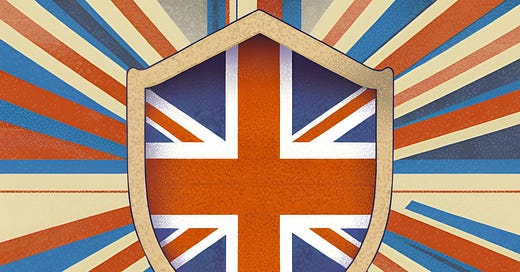
Welcome to the 31st Cable, our weekly roundup of British foreign and defence policy.
Will 2025 be a year of historical significance, like that of 1989 and 1945? It remains to be seen, but the re-election of Donald Trump, President of the United States (US), and the actions of his new administration point to a period of seismic change to the global order. Already we are witnessing the transformation of transatlantic relations, and the US turning on Ukraine while edging closer to Russia. In these turbulent times, His Majesty’s (HM) Government is taking action to enhance British and European security and ensure Ukrainian sovereignty.
Welcome back to the Cable!
Defence: Turning a corner?
Over the last two weeks, Europeans – Britons included – have been forced to look in the mirror. Trump has set about rebalancing the transatlantic relationship and expects European countries to pull their weight. The gulf looks set to grow further as Trump engages in a war of words with Volodymyr Zelensky, President of Ukraine, and with the US voting against a United Nations (UN) resolution condemning Russia for starting its full-scale invasion three years ago.
The European response to this tectonic transformation of global geopolitics has, so far, been lacklustre. Last week’s emergency summit in Paris displayed European disunity rather than a strong united front, with the second summit planned for later this week in London is also likely to end without concrete proposals for enhancing the continent’s security.
Against this backdrop, the United Kingdom (UK) is reverting to form, as it attempts to bind both sides of the Atlantic together. So far, HM Government has refrained from criticising Trump while also stating its aim to lead Europeans in guaranteeing Ukraine’s sovereign integrity. But to achieve this objective, the UK needs to show the new US administration that Europe is serious about its own security, while at the same time creating a European coalition of the willing to bolster Ukraine in its hour of need.
Given the growing international pressure, on 25th February, Sir Keir Starmer, Prime Minister, announced that he will boost defence spending to 2.5% by 2027, with the intention of rising to 3% by the next parliament. To fund this uplift, worth as much as £13 billion more each year for the British Armed Forces, Sir Keir announced a reduction in spending on Official Development Assistance, a largesse which has received growing national criticism. This marks a significant departure from David Cameron’s Conservative government, which reduced defence spending and ramped up aid delivery during the early 2010s.
Is Britain becoming a serious country again? While defence and aid spending have been being rebalanced since 2020, this remains unclear. The threat from the CRINK is growing and the UK will need far more resources to undergird the defence of Europe. And whether this initial uplift will be enough to placate Trump remains to be seen. But it is a start, and one from which to build a new era of British strategic leadership.
Key diplomacy
As the transatlantic crisis continues, Sir Keir held calls with a number of world leaders including: Alexander Stubb, President of Finland, Ursula von der Leyen, President of the European Commission, Mark Rutte, Secretary General of the North Atlantic Treaty Organisation (NATO), and Justin Trudeau, Prime Minister of Canada. These calls focused on Euro-Atlantic security and continuing support for Ukraine as the world reached the third anniversary of the start of Russia’s full-scale invasion.
Sir Keir also spoke to Emmanual Macron, President of France, on 23rd February, in which the two leaders discussed the need for the UK and France to increase their defence spending to meet their security needs and show united leadership in support of Ukraine. Additionally, Sir Keir and Macron discussed their upcoming visits to the US.
The Prime Minister also called Zelensky over the weekend, in which he reiterated Britain’s ‘iron clad’ support for Ukraine and that Kyiv must be ‘at the heart of any negotiations to end the war’. Sir Keir also stated that safeguarding Ukraine’s sovereignty was ‘essential to deter future aggression from Russia.’
David Lammy, Foreign Secretary, gave a speech at the Group of 20 (G20) foreign ministers’ meeting in South Africa last week, which focused on global geopolitics. In his speech, Lammy laid out HM Government’s foreign policy outlook, which focused on support for Ukrainian sovereignty, respect for international law, and a greater focus on conflict and instability in the so-called ‘Global South’.
Jonathan Reynolds, Secretary of State for Business and Trade, met with Piyush Goyal, Commerce Minister of India, in New Delhi on 23rd February, to relaunch talks to establish a free trade agreement between the two countries, after talks were paused nearly a year ago ahead of general elections in both countries. India is now the fifth largest economy in the world and is expected to enjoy the fastest growth rate in the G20 until 2030, with forecasts predicting the South Asian giant will become the third largest economy by 2028. Currently, the UK-Indian trade relationship is worth £41 billion a year, with India being the second largest source of Foreign Direct Investment (FDI) for Britain since 2020.
Defence
On 18th February, John Healey, Secretary of State for Defence, gave a speech on defence reform at an event held by the Institute for Government. Highlighting the worsening geopolitical environment and the need to increase British defence spending, Healey outlined the key reforms which HM Government is proposing. Streamlining decision making, increasing accountability and reducing waste across the MOD were central themes in the defence secretary’s speech. With the introduction of four new ‘senior leaders’ reporting directly to Healey – made up of a new Chief of the Defence Staff, a revamped Permanent Secretary, a new Director of Armaments, and a Chief of Defence Nuclear – coupled with the newly established Military Strategic Headquarters to streamline decision making and procurement across the armed services. Likewise, financial functions and procurement processes will be consolidated to cut waste further. Healey concluded his speech by stating that these reforms will lead to ‘...a more muscular defence for a more dangerous world. It will mean Britain, which is secure, at home, and strong abroad.’
Healey was in Norway last week to begin negotiations for a new defence agreement with the Northern European nation. The proposed strategic partnership will aim to enhance UK-Norway defence cooperation, develop closer industrial ties and strengthen both countries’ military capabilities to ‘face common challenges such as protection of critical infrastructure’ and Russian aggression. During his trip to the arctic circle, Healey stated that: ‘We will create a new era of defence partnership to bring us closer than ever before as we tackle increasing threats, strengthen NATO, and boost our security in the High North.’
The Ministry of Defence (MOD) has announced plans to develop ‘a deployable and persistent’ drone fleet to protect the North Atlantic. According to the UK Defence Journal, this plan will be built around the Type 92 Sloop – an uncrewed surface vessel – and the Type 93 uncrewed submarine, with the project (named CARBOT) focused on anti-submarine warfare. Initial reporting suggests that Project CARBOT would be delivered in two stages. Stage one would focus on patrolling the GIUK gap, while stage two would expand patrols across the North Atlantic.
Environment and climate
The Department for Energy Security and Net Zero (DESNZ) has announced that it is undertaking consultations to reform HM Government’s flagship Contracts for Difference renewable energy scheme. These reforms will focus on relaxing eligibility criteria for planning consent, changing offshore wind budgets to make investment more efficient, and increasing the Contracts for Difference terms beyond the 15 years currently stated to make contracts more cost effective.
According to a report by the Confederation of British Industry (CBI), Britain’s Net Zero economy is ‘booming’, with the green sector growing three times faster than the overall UK economy. Between 2023 and 2024, the sector grew by 10.1% to £83.1 billion in Gross Value Added (GVA), while employment in the sector has grown by 10.2% over the same period to just over 950,000 jobs. Following the release of the report, Louise Hellem, Chief Economist at CBI, stated ‘It is clear, you can’t have growth without green – 2025 is the year when the rubber really hits the road, where inaction is indisputably costlier than action.’
How Britain is seen overseas
The German Institute for International and Security Affairs released a working paper analysing how the UK can participate in the European Union’s (EU) Common Security and Defence Policy (CSDP) as a third party. Highlighting that both Britain and the EU have overlapping security concerns and interests, institutional barriers erected after the UK left the bloc result in considerable challenges for developing deeper cooperation. The paper concludes that while there is ‘significant leeway for deepening EU-UK security and defence cooperation on existing CSDP instruments’, the highest level of security and defence partnership would currently be impossible without the UK rejoining the single market or substantial changes being made to EU to allow Britain as a third-party to have a special relationship with the bloc.
How competitors frame Britain
Russia Today released propaganda stating that Britain’s ‘working class’ will never fight for Ukraine. Citing Sir Keir’s supposed unpopularity, resentful working-class communities and an opinion poll in The Times which found that only 11% of British Gen Z would fight for their country, the article suggests that HM Government would be hard pressed to enact a British deterrent force to Ukraine. Russia should look in the mirror: it ‘press gangs’ criminals and minorities because many ethnic Russians would not want any part in the Kremlin’s war of aggression.
China Daily published an opinion piece in which it derides British military aid to Ukraine as ‘dangerous gimmicks’. The piece suggests that the UK should ‘...spend more on public services instead of arms for Ukraine, which only prolongs the conflict…’. What happened to upholding the principle of state sovereignty and non-interference, which the Chinese Communist Party is so keen to stress? It appears it only applies when Chinese interests are at stake!
Assessing national power
Over the last 20 years, Britain has been on a rollercoaster ride with international development. In 1997, the New Labour government of Tony Blair created a new department – the Department for International Development – to oversee the delivery of Official Development Assistance (ODA), forms of material assistance delivered in keeping with the 1969 definition of aid developed by the Development Assistance Committee (DAC) of the Organisation of Economic Cooperation and Development (OECD). The year that DFID was founded saw the UK spend 0.26% of Gross National Income (GNI) on ODA, falling to a low of 0.24% in 1999, before rising gradually to 0.51% in 2005. The average for the Blair years was 0.34% of GNI, while the average during Gordon Brown’s premiership was 0.46%.
Under the leadership of David Cameron and Theresa May, ODA spending hovered at around 0.5% of GNI between 2010 and 2012 before shooting up to 0.7% between 2013 and 2020. This was enshrined into law in 2015, with an Act of Parliament – though there is no punitive sanction if the government does not meet the target.
So, from 2010 to 2020, Britain spent around £130 billion (using constant 2021 prices) on ODA. Due to public outcry over a number of aid excesses – and frankly absurd projects, and in unfriendly countries, such as the PRC – the government of Boris Johnson merged DFID into the Foreign Office, while the Covid-19 pandemic led his government to reduce ODA spending from 0.7% of GDP to 0.5%.
The worsening geopolitical environment in Europe and the need to spend more on defence has encouraged the new Labour government of Sir Keir to trim ODA once again. As defence spending goes up to 2.5% of GDP, ODA will be reduced to 0.3% – a level more in keeping with the government of Tony Blair.
How this affects British power remains to be seen. ODA advocates say it will reduce British ‘soft power’ and undermine Britain’s national influence. Yet, remember that, according to DAC rules, assistance must be given exclusively for altruistic purposes. There is no study to determine how British increases (and decreases) in ODA have affected the country’s international standing, either in the recipients of British assistance, or more generally.
What we do know is that many of the countries in which the UK has given ODA appear to care very little about British interests. All of the countries which have received ODA from the UK – even significant sums, such as Ethiopia, Afghanistan, Syria, Yemen, Nigeria, and Somalia – tend to support Russia or the PRC in the organs of the UN. In the General Assembly vote over the International Court of Justice’s advisory opinion over Mauritius’ claim of sovereignty over British Indian Ocean Territory in 2019, for example, not one recipient of British ODA other than the Maldives sided with Britain.
The question now is: what next? Is it time for a radical rethink on ODA, or will Britain simply continue to deliver a level of spending more in keeping with historical norms (and its peers). And how can the UK deliver aid more effectively and efficiently in an era of growing geopolitical confrontation, when defending allies and partners and deterring opponents requires a greater share of the national output? There may be a strong case for providing assistance to boost less developed countries’ national resilience, but if so, why not set a better national framework for aid delivery, one focused explicitly on the support of British national interests, rather than altruism?
If you found this Cable useful, please subscribe or pledge your support!
What do you think about this Cable? Why not leave a comment below?


















A key Q: Post Boris Johnson and Brexit, "Is Britain becoming a serious country again?"